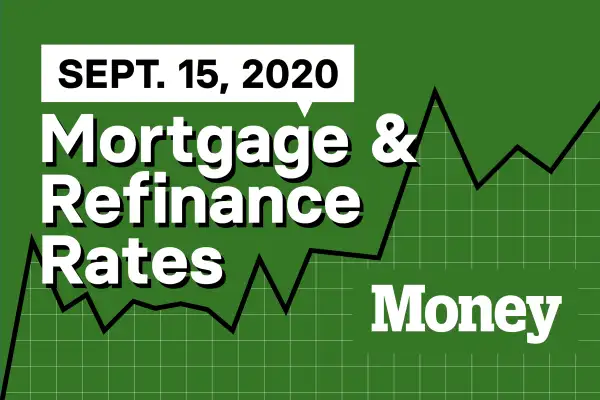Here Are Today's Best Mortgage & Refinance Rates for September 15, 2020

Borrowers with 700 credit scores were quoted an average rate of 3.477% to secure a 30-year fixed-rate purchase mortgage on Monday, according to Money's survey of over 8,000 lenders across the United States. At this credit score, roughly the national average, the average rate for a 30-year refinance was 4.334%. Our rates include discount points and are for borrowers putting 20% down.
| 30-year fixed-rate purchase mortgage |
| 3.477% |
| Rate of September 14, 2020 |
Borrowers in Washington, D.C. were quoted the lowest mortgage rates on Monday—at 3.283%. Those in Florida saw the highest average rate at 4.096%. Nationwide, borrowers with the highest credit scores, 740 and above, were quoted rates averaging 3.164%, while those with credit of 640 or below were given rates of 4.859%—a 1.576 percentage point spread.
You may be able to negotiate a lower rate if you shop around or if you have other accounts with the lender. (Money's picks for the best mortgage lenders are here). Currently, some banks are hiking up advertised rates to keep demand in check, so you may be offered a lower rate if you reach out directly.
Freddie Mac's widely quoted Primary Mortgage Market Survey put rates at 2.86%, a new record low, with 0.8 points paid for the week ending September 10. The mortgage purchaser's weekly survey reflects borrowers who put 20% down on conforming loans and have excellent credit.
Refinance rates today
Money's survey shows that the offered rate for a 30 year refinance for someone with a 740 credit score was 3.675% on Monday. Last September, the average mortgage rate (including fees) was 3.922%.
| 30-year fixed-rate mortgage refi |
| 3.675% |
| Rate of September 14, 2020 |
A homeowner with a $200,000 mortgage balance currently paying 3.922% on a 30-year loan could potentially cut their monthly payment from $946 to $918 by financing at today's lower rates. To determine if it's worth it to refinance your mortgage, also consider the closing fees you paid on your current mortgage, how much your new lender is charging and how long you have left on your loan term. (Our picks for the best lenders for refinancing are here).
What else is happening in the housing market right now?
The overall number of mortgage loans in forbearance plans dropped 15 basis points week-over-week, from 7.16% to 7.01%, according to the Mortgage Bankers Association. The MBA estimates that 3.5 million homeowners remain in payment deferral plans, down from an estimated 3.6 million last week.
Though more homeowners left forbearance plans than entered them last week, the share of homeowners requesting forbearance did tick up 0.02 percentage points, from 0.09% to 0.11%.
"Forbearance requests increased over the week, particularly for Ginnie Mae loans. With just under 1 million unemployment insurance claims still being filed every week, the lack of additional fiscal support for the unemployed could lead to even higher increases of those needing forbearance," said Mike Fratantoni, chief economist for the MBA.
Mortgage Prediction of the Week
Expert views on what comes next
John Burns, CEO of John Burns Real Estate Consulting, on the future of the U.S. housing inventory:
Supply will increase slowly over the next few years, despite what the naysayers say about surging foreclosure volumes. A high-quality home has never been so important because people are spending so much time in the home, and the government is doing everything it can to keep people in their homes and to keep home prices high. New home supply will ramp up beginning next year, as the homebuilders have only increased land-buying activity very recently, and it takes a while to get building approvals."
For more information on the housing supply, read Money's When Will It Get Easier to Buy a Home? 8 Experts on the Nation's Housing Shortage
